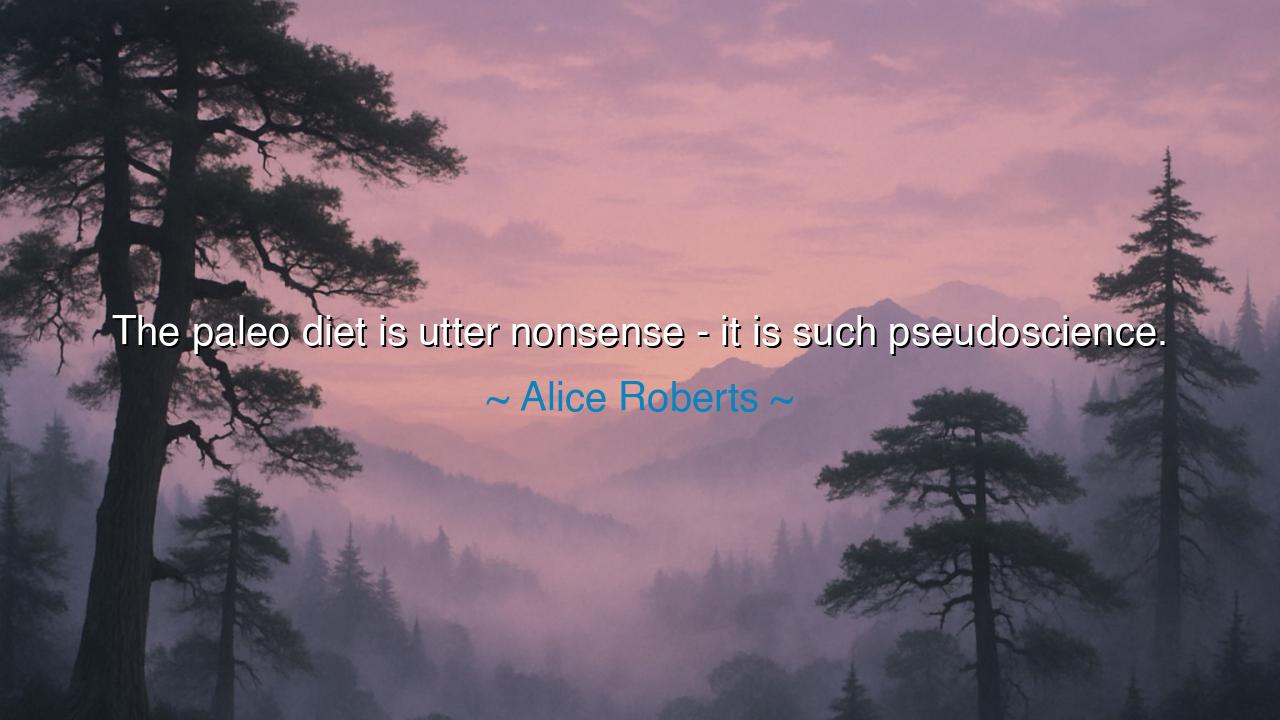
The paleo diet is utter nonsense - it is such pseudoscience.






When Alice Roberts declared, “The paleo diet is utter nonsense — it is such pseudoscience,” she spoke not as a cynic, but as a guardian of truth in an age clouded by illusion. Her words, sharp as a blade and clear as spring water, cut through the fog of modern fads and false prophets. Beneath her rebuke lies a timeless warning — that humanity often mistakes nostalgia for wisdom, and that to idealize the past without understanding it is to walk backward into ignorance. Roberts, a scientist and scholar of human evolution, reminds us that truth must rest not upon longing or myth, but upon knowledge, evidence, and reason.
The paleo diet, she argues, is not a path back to authenticity but a mirage — a romantic vision of a prehistoric world that never truly existed. Those who follow it imagine they are returning to the simplicity of ancient hunters, to a time before agriculture, before processed foods, before the decay of modern habits. Yet Roberts, like a philosopher among dreamers, reminds us that the ancient world was not pure, but perilous. Our ancestors did not eat by principle but by survival — consuming whatever the earth offered and chance allowed. To emulate their diet without their hardship, she says, is to imitate the shadow and not the substance.
Her words echo the wisdom of the ancients who warned against false idols of simplicity. In every age, there have been those who seek salvation not through understanding but through imitation. The Stoics taught that virtue lies not in the replication of the past, but in harmony with nature as it is. Just as a sailor must read the winds of his own time, not those of centuries past, so too must we eat and live according to the truths of the present, informed by science and guided by discernment. Roberts’ condemnation of pseudoscience is, in essence, a defense of intellectual humility — the courage to say, “I will not believe what flatters my instincts but what withstands the light of reason.”
Consider the legend of Paracelsus, the Renaissance physician who challenged the false cures and alchemies of his day. The people worshiped potions promising eternal youth, yet Paracelsus stood against the tide and said, “All things are poison, and nothing is without poison; only the dose makes the poison.” He did not reject nature, but sought to understand it deeply. So too does Roberts: she does not scorn our primal roots, but warns us not to distort them. To follow the “paleo” ideal blindly is to drink from a well of half-truths, mistaking stories for science and marketing for meaning.
Her tone, though fierce, is not one of mockery — it is one of protection. She defends the integrity of science as the ancients defended the sanctity of the temple. In a world where every voice can shout its “truth,” Roberts becomes a priestess of reason, urging humanity to discern between the real and the alluring. She knows that the danger of pseudoscience is not merely misinformation, but the loss of trust in truth itself. Once people abandon evidence for feeling, they no longer walk on solid ground but drift wherever the wind of fashion blows.
Yet her message is not cold or cynical — it is profoundly hopeful. For Roberts believes that true wisdom is not found in rejecting the body or the past, but in uniting both with understanding. The key is not to eat like our ancestors, but to learn from them — to remember that survival was once fragile, that knowledge was hard-won, and that we now possess the power to build upon their struggle. The ancients revered learning as a divine act; Roberts continues that lineage, calling us to use our minds as our greatest tool for health and harmony.
So, let this be the lesson: seek not the comfort of myth, but the challenge of truth. Question every doctrine that promises purity or perfection. Remember that wisdom is not found in imitation but in understanding the reasons beneath the rules. Eat not as cavemen imagined by marketers, but as thinking beings shaped by evolution and guided by knowledge. For the truest diet is the diet of the mind — nourished by evidence, seasoned with humility, and sustained by curiosity. As Roberts teaches, beware of pseudoscience, for it feeds the hunger of the heart but starves the strength of the soul.






AAdministratorAdministrator
Welcome, honored guests. Please leave a comment, we will respond soon